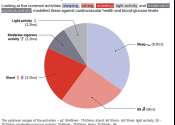Researchers find better way to detect when older adults fall at home
When older adults fall at home, every second counts—especially when they are alone.
Jun 27, 2024
0
2
When older adults fall at home, every second counts—especially when they are alone.
Jun 27, 2024
0
2

Balance can be impacted by various factors, including diseases such as Parkinson's disease, acute and chronic injuries to the nervous system, and the natural aging process. Accurately assessing balance in patients is important ...
Jun 26, 2024
0
19

For survivors of strokes, which afflict nearly 800,000 Americans each year, regaining fine motor skills like writing and using utensils is critical for recovering independence and quality of life. But getting intensive, frequent ...
Jun 4, 2024
0
27

A new study to be presented at the SLEEP 2024 annual meeting, held in Houston, Texas, June 1–5, offers a framework for an objective, non-invasive and zero-effort sleep monitoring system utilizing smart thermostats equipped ...
Jun 4, 2024
0
0

Skin can send certain health-related signals, such as dry skin feeling tighter to indicate the need for moisture. But what if skin could be smarter, capable of monitoring and sharing specific health information, such as the ...
May 30, 2024
0
1

A smart neckband allows wearers to monitor their dietary intake. Automatically monitoring food and fluid intake can be useful when managing conditions including diabetes and obesity, or when maximizing fitness. But wearable ...
May 8, 2024
0
0

People have a pretty intuitive sense of what is healthy—standing is better than sitting, exercise is great for overall health and getting good sleep is imperative.
May 2, 2024
0
0

Researchers at Baylor College of Medicine in collaboration with the University of Arizona led a study that can help surgeons obtain biofeedback of their posture during long surgical procedures. Ultimately, the aim is to reduce ...
Apr 19, 2024
0
0

Low-cost, wearable sensors could increase access to care for patients with Parkinson's disease. New machine-learning approaches and a baseline of data from healthy older adults improve the accuracy of the results from such ...
Apr 12, 2024
0
0

Children who live in areas with natural spaces (e.g., forests, parks, backyards) from birth may experience fewer emotional issues between the ages of 2 and 5, according to a study published in JAMA Network Open.
Apr 10, 2024
0
34

A sensor is a device that measures a physical quantity and converts it into a signal which can be read by an observer or by an instrument. For example, a mercury thermometer converts the measured temperature into expansion and contraction of a liquid which can be read on a calibrated glass tube. A thermocouple converts temperature to an output voltage which can be read by a voltmeter. For accuracy, all sensors need to be calibrated against known standards.
This text uses material from Wikipedia, licensed under CC BY-SA